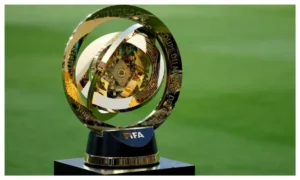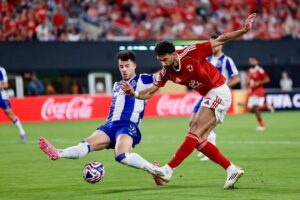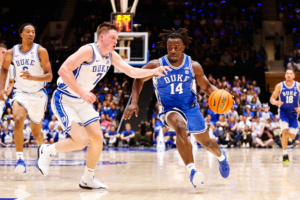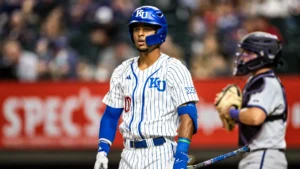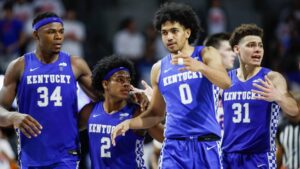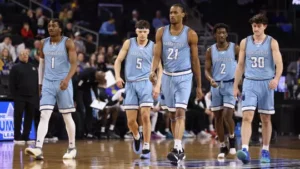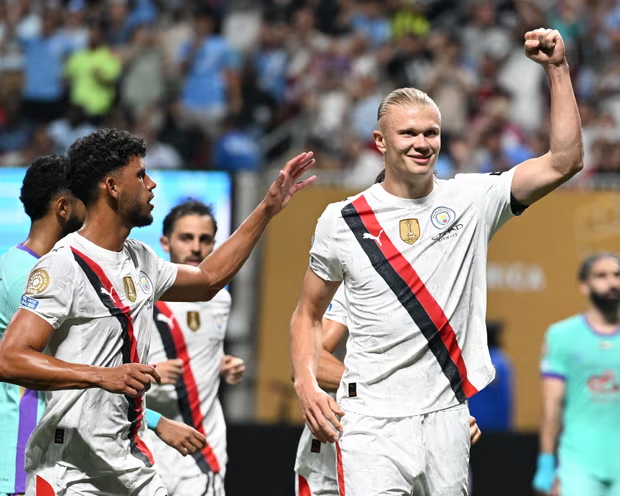
In a dazzling display of depth, ambition, and sheer class, Manchester City dismantled Al-Ain with a commanding 6–0 victory in their second Group G match of the FIFA Club World Cup at Mercedes‑Benz Stadium in Atlanta. That resounding win cemented City’s place in the knockout stage, and signaled their intent to dominate the tournament—but also left a tantalizing question hanging: could they have claimed even more? Here’s the story of a night where City didn’t just roar—they stamped their authority on global football.
Barely a minute ticked off the clock when İlkay Gündoğan danced into space and sent a chipped cross over the Al‑Ain goalkeeper, Khalid Eisa. The ball looped gently into the net in the 9th minute, a touch of finesse that set the tone for what was to come . Gündoğan’s strike spoke volumes—not just for its beauty, but for what it represented: a team seizing control from the jump.
Al‑Ain, though more ambitious than in their 5–0 thrashing by Juventus, managed only a fleeting attempt from Nassim Chadli, and even that was thwarted by City’s alert keeper, Stefan Ortega, who wristed the effort wide . The balance of the contest was clear: City held the reins.
City rotated their lineup entirely from their previous match, underscoring manager Pep Guardiola’s trust in the squad’s depth. Newcomer Claudio Echeverri, making his first City start, glittered early. His beautifully curled free-kick from around 20 yards in the 27th minute beat the wall and the keeper, doubling the lead and eliciting gasps from the crowd. The Argentine teen, a January arrival, demonstrated why whispers of “the next Messi” are circling.
Erling Haaland, resuming penalty duties after relinquishing them in the FA Cup final, was denied on the breakthrough, but he made no mistake when granted a spot-kick in first-half stoppage time after Rami Rabia clumsily hauled down Manuel Akanji. Haaland sent Eisa the wrong way—bottom right—and chalked up City’s third before the interval, his 32nd goal of the season.
The second half unfolded as a masterclass in game management and relentless probing. Haaland had more chances but was twice denied by Eisa, underscoring how even the most dominant performance can still yield drama . Matheus Nunes had a fierce volley just miss, but soon Gündoğan struck again. In the 73rd minute, Bernardo Silva found space at the edge of the area, squared the ball to Gündoğan, who curved an exquisite chip beyond Eisa—6–0 now in City’s control.
The goals kept coming. Oscar Bobb, returning from a long-term injury, slid into the net in the 82nd minute after cutting inside—his first competitive goal since his fracture earlier this year. And with time winding down, new signing Rayan Cherki sealed the rout with a composed finish from the edge of the box, showcasing youthful promise.
Tactically, Guardiola’s decision to rotate all 11 starters paid immediate dividends. He not only fielded a winning side but ensured that every player, whether veteran or newcomer, was match‑sharp for the imminent challenges. The midfield marshal Gündoğan, ably supported by Nunes and Silva, ran the show. Meanwhile, the fresh defensive corps stifled Al‑Ain, whose rare chances were snuffed out, spotlighting City’s collective discipline .
Yet, despite the emphatic outcome, there were murmurs of unfulfilled potential. Guardiola himself admitted slight disappointment at failing to reach a seven-goal margin, which would have leapfrogged Juventus at the top of Group G . Gündoğan echoed the sentiment, noting: “I think the result speaks for itself… but we had moments to push for more” . The blunt truth: City had aimed higher in goal difference.
Still, the victory ensures City and Juventus now sit level in Group G—same points, same goal difference—but Juve hold an edge in total goals (9 to City’s 8). The next fixture, a showdown in Orlando, will determine group positioning and affect who they might face in the round of 16—the top spot likely pitting them against a smoother path, the runners‑up possibly meeting Real Madrid .
Beyond the immediate stakes, the evening had uplifting moments. Claudio Echeverri’s free-kick was a glimpse of a prodigy in the making, and Guardiola praised how he’d practiced shots after training—a habit borne out in the goal . Gündoğan got his affirmations, and Oscar Bobb’s return injected fresh joy. Even Rayan Aït‑Nouri, making his debut days after joining from Wolves, earned plaudits for his energy at left-back.
Al-Ain, for their part, were bedraggled but not broken. They showed more ambition than against Juventus, and had two clear chances(saved by Ortega) late in the first half . Their presence in the Club World Cup is a testament to their standing within UAE and Asian football—they even reached the 2018 final against Real Madrid —but this night belonged to City.
The result places City in a commanding position as they chase global silverware. The scoreline might not have secured group-topping glory, but it sent a statement: depth, class, and ambition are intact. With Gündoğan in veteran form, Haaland’s unwavering strike rate, and new faces stepping up, City’s title bid looks formidable.
Looking ahead, their fitness is intact, the younger players are battle-hardened, and confidence is sky-high. The final group match against Juventus will test their mettle—and whether Guardiola’s squad can hit an even higher gear. Victory in that clash won’t just secure a more favorable path, it’ll crown them as champions of Group G and send a ripple through the tournament.
In the end, Manchester City didn’t just win—they conquered. A 6–0 drubbing, a statement of intent, and a reminder that in global football, they remain among the elite. But as Gündoğan’s post-match reflection suggests, the roar isn’t over—they know there’s further to climb, and they’re determined to reach it.
